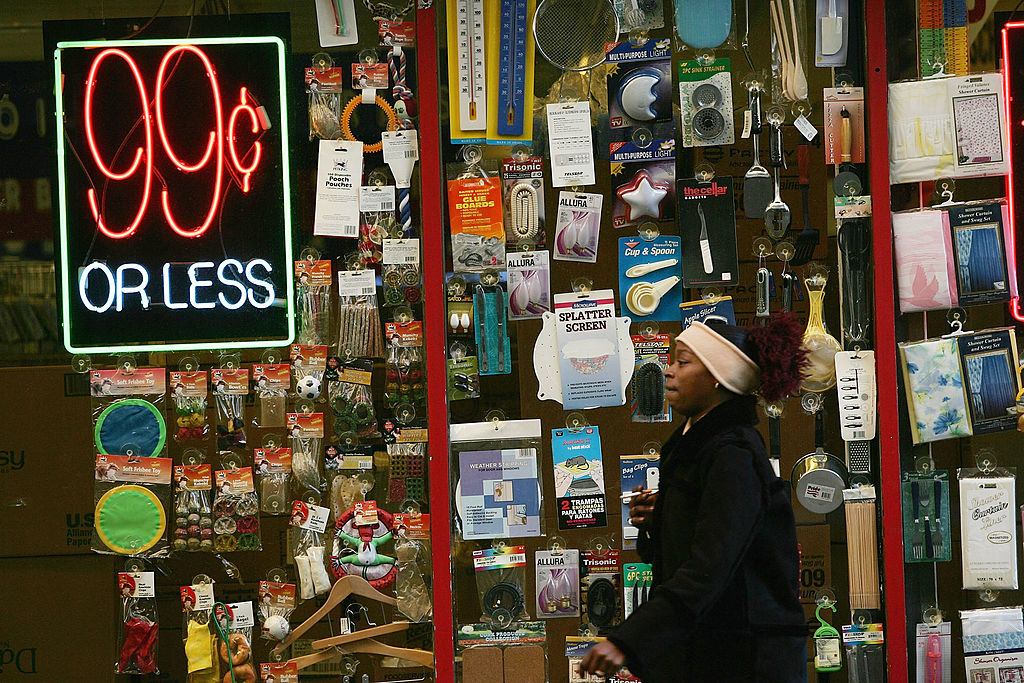
Dollar store deals might look like a bargain from the outside: everything usually is a dollar or at least close to it. But looking at the harmful product ingredients, it can turn out to be not a bargain after all.
Recent testing of Dollar Store products found that nearly 81% contained one or more hazardous chemicals. The tests, conducted by a third-party consumer testing group, found chemicals associated with cancer, obesity, diabetes, asthma, thyroid and kidney diseases, learning problems, lower IQ, birth defects and early puberty. Here are some items you should think about buying from elsewhere.
9 Items You Should NOT Buy from the Dollar Store
9. Wellness Products (Vitamins, etc)
Wellness products and vitamins can be expensive, especially when it comes those with a higher dosage that you may need, but the solution to savings isn’t and shouldn’t be found at the dollar store.
“Anything that you would take internally, like vitamins, should be skipped,” says Chicago primary care physician, Dr. P. Gould. “You don’t know what could truly be in them and if there are any added ingredients that you could be allergic to or doesn’t mix with your body chemistry. Don’t take any chances — just shop at the pharmacy, a big box store or a wholesale warehouse for those.”
Non-ingestible wellness products are just fine to buy at dollar stores. “Name-brand cotton balls/swabs are good to get at the dollar store, but I would avoid generics,” says Bodge.
8. Skin Care Products
Finding good prices on beauty products can be a challenge. That’s why it may seem tempting when you find a great deal. However, don’t try any shortcuts at dollar stores.
Dermatologists issue a warning saying, “If something is not a name brand, skip it, especially with skin care products, and especially those with SPF, which tends to degrade over time. It’s hard to tell how long these products have been sitting on the shelves, and it’s not worth the risk.”
There are exceptions. “Some name-brand beauty products are available at the dollar store, so if you spot a favorite brand and the product looks fresh, I’d say go for it,” some say. For example, a Blistex or Vaseline lip balm stick is still a good value at $1.25.
7. Black Plastic Utensils
The black solid color spoons, spatulas and forks may contain high levels of bromine, a component in flame retardants or BFRs. Though these are added to make the products resistant to fire, they have been linked to cancer, birth defects and impaired brain development. That ingredient has effectively been phased out in the U.S. but they are still available in these cheap, dollar store utensils.
What To Do: Use stainless steel or real wood utensils.
6. Plastic Silly Straws
Plastic straws can pose some health concerns due to potential chemical leaching, environmental pollution, and their impact on dental and digestive health. Some chemicals in plastic, like BPA and PFA, may migrate into drinks, potentially affecting the endocrine system or causing other health problems. Additionally, using straws can increase the risk of cavities, digestive issues, and even wrinkles.
What To Do: The official brand of “Silly Straws” and non-plastic straws (look for recycled cardboard) are BPA and PVC-free.
RELATED: 5 Red Flags you Shouldn’t Ignore at The Grocery Store
5. School Toys
I’m guilty of this: You have young kids and you take them to the dollar store and spend under $10 bucks making you look like superstar parent. Or you may see a toy from your childhood that you had fun with growing up and want it for your kid, but it could be toxic now. Just because an item doesn’t have an expiration date doesn’t mean it’s a good idea to buy it. Sometimes dollar stores sell factory closeouts, which means their stock may be old and should not be purchased. For example, plastic toys made before 2008 are more likely to contain phthalates than toys made since 2008, the year that phthalates were banned from being included in children’s toys.
4. Plastic food containers
Tupperware is a leading brand in the plastic food container space for a reason: Their products are dishwasher, microwave, and BPA-safe. But at dollar stores, the only food storage containers you’ll find are those made from flimsy plastic possibly full of toxins. This may result in the storage container melting in the dishwasher or releasing harmful chemicals if placed in the microwave.
If you think you can use and reuse those “to-go” food containers, think again. Although they’re considered a bargain at dollar stores, and they’re super convenient in terms of organizing your kitchen, plastic food containers may contain phthalates, which cause reproductive problems in lab animals and are found in high levels, especially in women, in the U.S. population. Over 30 percent of some dollar store products tested had higher levels than are recommended in products used for children. When it comes to food safety, don’t cut corners by shopping at the dollar store.
3. Styrofoam cups and plates
Styrene is a known carcinogen. It’s widely used in the manufacturing of styrofoam cups, plates, and packing peanuts—and a lot of other household goods. Chronic exposure to these kinds of styrofoam products can result in more severe effects including depression, headaches, fatigue, weakness, hearing loss, and disrupted kidney function.
What To Do: Plastic cups are a better and quick option
2. Perishable and Non-Perishable Food
This should go without saying, but those munchies and cheap eats sometimes call your name when you shop at the dollar store. But, beware of any products you’ll actually put in you or on you.
“When you look at perishable and packaged foods, including quick to-go snacks like candy and drinks, freshness and quality can be questionable, so I would proceed with caution, unless the food is in a can (canned goods have a longer shelf life than other packaging options),” Dietician Mary Toscano describes. “Yet even with canned goods, be wary of double labelling food items–meaning their shelf life could have passed, but then another label was put on top to show “freshness.” You have no idea how long something has been sitting around, so be sure to look for expiration dates.
And even if you’ve verified freshness, is that $1.25 price tag really good value? Not always during price checks. It pays to double-check the going rate at nearby stores. In most cases, it’s best to opt instead for supermarkets, which frequently run deals (especially for store loyalty card holders) and also offer trusted store brands that are especially cheap even when they aren’t on sale.
What To Do: Look for sales at your quality supermarkets
1. Cheap Cleaning Products
It may look similar to your higher-end cleaning products, but some cheap dollar cleaning liquids contain formaldehyde. Formaldehyde is a known carcinogen found in a variety of cleaning products, according to the U.S. Department of Health and Human Services.
Also, you’re probably not saving money. With inflation roaring away in the supermarket aisles, it may be tempting to buy frequently used cleaning products at dollar stores. However, the product is weaker than you think.
“Skip liquid detergents, unless there is an expiration date,” says shopping expert Keith Bogle. “Liquid detergents tend to lose their efficacy over time, so if the product has been on the shelf for over a year, it won’t be as effective.”
What To Do: When it comes to cleaning spaces and dishes that you use frequently, go ahead and buy the higher-priced/healthier cleaner. It may cost more, but it’ll give you peace of mind and that’s priceless.
BONUS: Holiday Lights
Shopping at the dollar store during the holidays can save us a lot of money, but at what cost to our health?
There are high levels of chlorine and bromine, including flame-retardant chemicals in these have been linked to cancer and thyroid problems and some “slightly defective” electronics may be available for purchase, but may not be as safe for home use.
What To Do: When buying holiday lights, check the tags to make sure they are ROHS-compliant.









